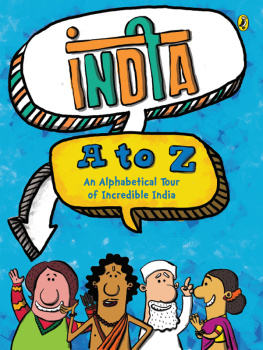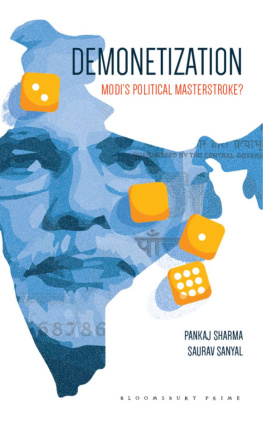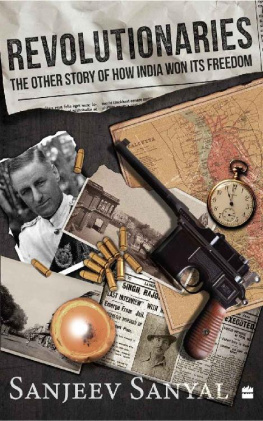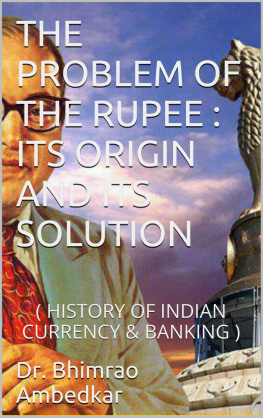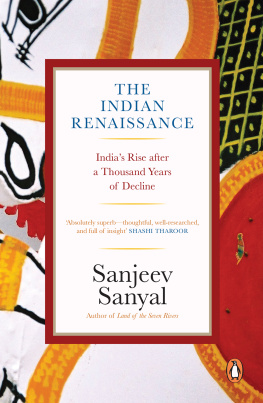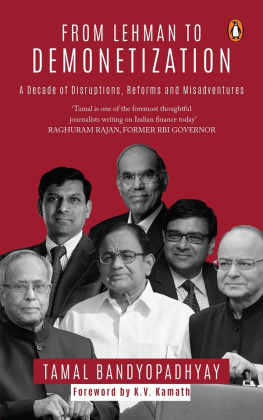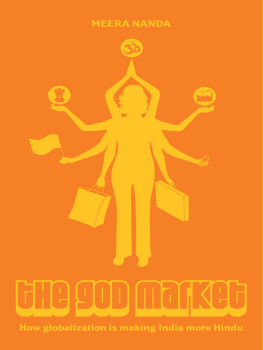Table of Contents
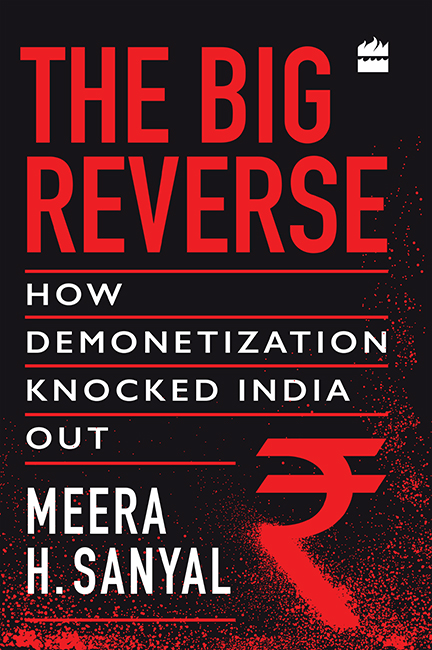
THE BIG REVERSE
HOW DEMONETIZATION
KNOCKED INDIA OUT
MEERA H. SANYAL

This book is dedicated with love to
The late Vice Admiral Gulab M. Hiranandani, my Father and Guide
Banu Hiranandani, my Mother and Mentor
Ashish J. Sanyal, my Husband and Friend
Contents
I ndians are a resilient people. Perhaps, all people are. But there is a stoicism about Indians, especially in the face of adversity, that foreign observers have traditionally dismissed as fatalism. In truth, there is nothing fatalistic about our tremendous capacity to accept life as it comes and to get on with it, armed with the belief that our misfortunes and those who visited them on us, will pass on in time.
We are also an innovative race, with an incredible ability for jugaad when faced with odds that would be daunting for others.
In recent times, there has been no better demonstration of this resilience and tremendous capacity for innovation than the response to and recovery from the dramatic demonetization announced by the Prime Minister, Narendra Modi, on 8 November 2016.
I write this book both as a banker and as a deeply committed and active citizen of India, for I believe the demonetization story must be told.
Ours was an armed forces family. My father was transferred to different parts of the country during our childhood. During our many transfers we were exposed to the diversity of India and grew up with people of all castes and religions. It was an India in which we were all striving to make something of our lives, in a country that was emerging from the scars of Partition.
Ours was a home filled with books, laughter and arguments. My brother and I were encouraged to have a point of view and every point of view was acceptable so long as it was expressed courteously and backed with logic and facts. Our mother, a lawyer by training, urged us to excel in our studies. She taught me to read and write in our mother tongue, Sindhi, which laid the foundation of my love of languages. Our father, an idealistic naval officer, told us that we must serve our country, and through personal example, taught us what it meant to truly love ones country.
My first exposure to living abroad was at the age of 17, when I accompanied my parents to the still extant Soviet Union. We lived in a small town in Georgia, on the shores of the Black Sea. I learnt Russian and studied for my Bachelor of Commerce degree via a correspondence course. The Soviet economic system was visibly under pressure. I gained an understanding of the economic perils of a Communist state and what it felt like to live under the whims of an authoritarian regime. The goodness and warmth of the ordinary people we interacted with reminded me of people back home. So did the endless queues; though, in comparison, life in India seemed quite advanced!
I returned to Sydenham College in Mumbai to complete my degree and threw myself into college activities like debating, quizzing and dramatics. I continued my Russian studies and took up French and German in addition. An international students organization called AIESEC was trying to establish its Indian chapter, and I became one of its founding members.
This was my initial grounding in management. Though full-time students, we set up the organization, raised funding, organized traineeships for Indian students to work abroad, and welcomed foreign students to be trained in India. I myself undertook two traineeships, the first with NKT, Denmark, a telecom cable manufacturer, and the second with Electrolux, Sweden. I learnt how to roll up my sleeves and work on the factory floor and go door-to-door, selling vacuum cleaners! I got exposed to the Scandinavian socialist economic model, where the government encouraged free market policies but also ensured a basic standard of living and a level playing field for everyone.
After completing my BCom degree with a top 10 rank in Mumbai University, I joined IIM Calcutta for an MBA programme. In the meanwhile, I had secured admission and a scholarship to INSEAD, one of the leading business schools in the world. After a term at IIM, I left for France. After graduating at the top of my class, I was offered highly paid jobs in the USA, France and Sweden, but chose to return to India and acquire a solid foundation in banking and finance.
I started my banking career in the current accounts department of Grindlays Bank in Kolkata. The hours were punishingly long since the entire operation was manual. In addition, I had to deal with seven aggressive trade unions and their several members who worked in my department. It was a trial by fire, but it gave me a thorough grounding in banking and taught me what management was truly about. When I started to learn Bengali, the doors of communication with my team opened, as they appreciated the effort more than my knowledge of the language.
I grew to be the Planning Officer for eastern India, and led the first wave of computerization for the banks eastern region. But I wanted to be an investment banker, and so joined one of the best merchant bankers in the country. This was the era when India was just beginning to welcome foreign investment. In addition to foreign currency loan syndications and equity offerings, I specialized in advising multinational corporations on how to enter India. Working closely with the ministries of finance, commerce and industry, I secured approval for the first foreign investment into the financial services industry in India that of the investment bank Lazard.
I owe a great deal to my boss in this organization, for he not only gave me a grounding in investment banking and corporate finance, but also allowed me to work flexible hours, enabling me to fulfil my duties as a mother and wife, while continuing with my job. The support and encouragement of my husband, my parents and in-laws made it possible for me to balance home and career.
The winds of economic liberalization were sweeping across India at the time. In the course of my interactions with senior bureaucrats, I was often requested to submit white papers on various topics. I loved dealing with such policy challenges, and so resigned from my job and set up a think tank to provide policy inputs, to both corporates and the government. Post the 1992 liberalization, ABN AMRO approached me to head their investment bank in India.
ABN AMRO was one of the worlds leading project finance banks. I was happy to join it as this gave me an opportunity to gain the expertise needed for financing the massive infrastructure projects on the horizon power, telecom, highways, airports, ports, and oil and gas projects. I spent intensive months with the banks expert teams in Chicago to learn how to structure these long-term, complex financings and understand the risks associated with them.
Over the next five years, our team became the powerhouse of project finance for infrastructure projects in the country. We arranged financing for all the initial telecom operators in India and several major power projects, with due financial prudence. One project I declined to finance was the Dabhol Enron power project, on the grounds that the power purchase agreement was clearly unfair to the Indian consumer and hence could not be economically viable. To my regret, I was overruled and the financing was arranged via Chicago, resulting in large write-offs and losses for the bank.
I feel very proud and privileged to have arranged funding for the power sector, which has led to power sufficiency and the electrification of villages across the country, and for the telecom sector, which has led to a mobile phone in the hand of almost every Indian. One of my most vivid memories of the time was working hard to persuade credit committees in Amsterdam to extend facilities to Indian start-ups in the telecom business. A sceptical colleague who had asked sarcastically if I wanted the bank to finance mobile phones for millions of poor Indian farmers, had the grace to call me the other day and say that the seeds of a digital India, powered by mobile telephony, were sown through the financing efforts undertaken by me and my team.


